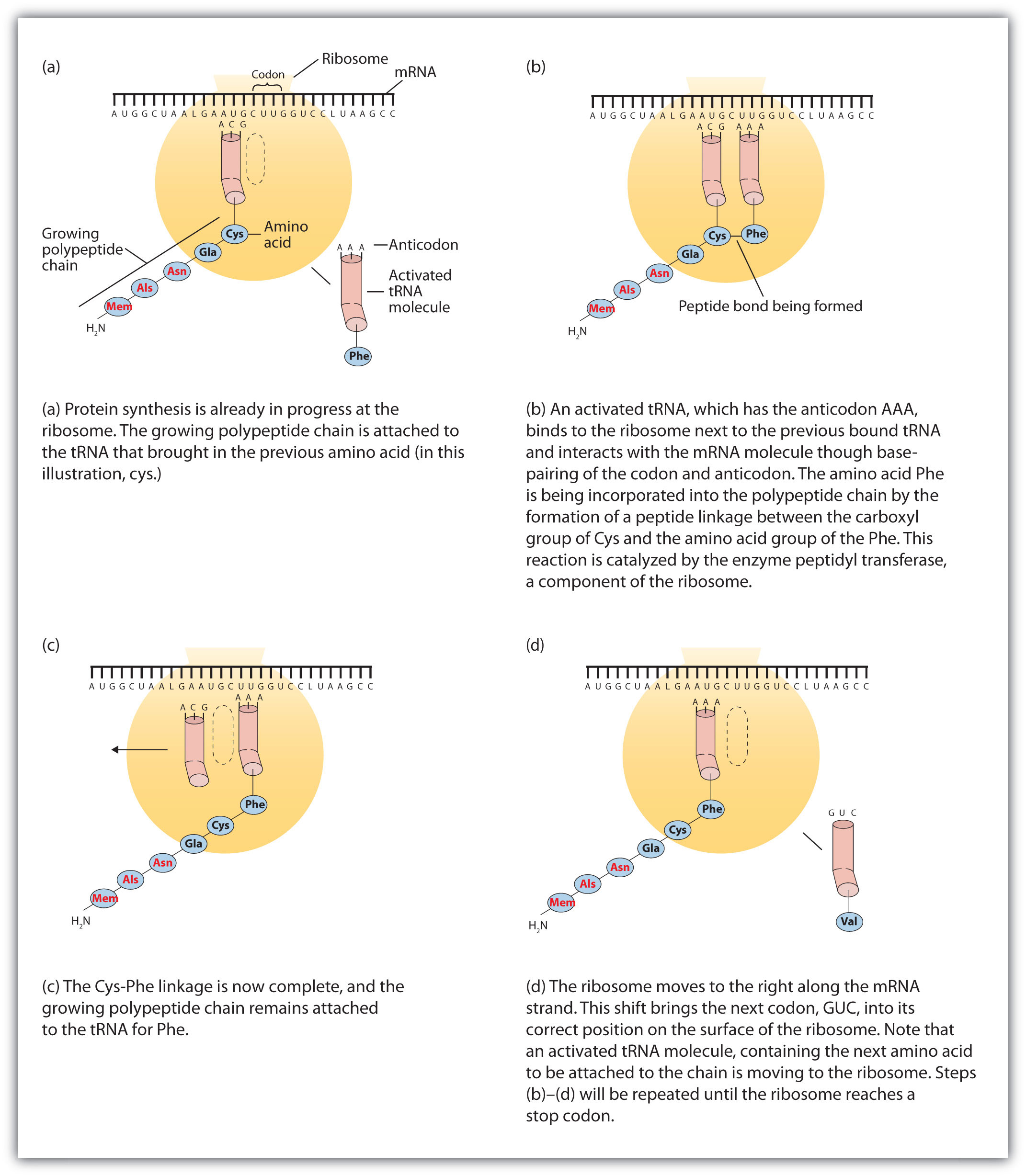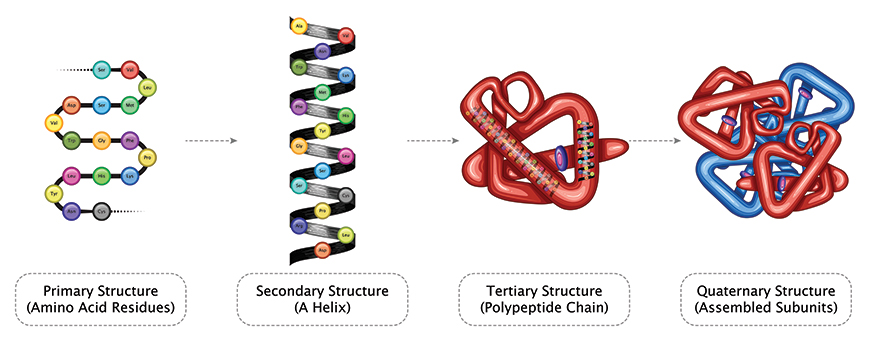Four Stages in the Production of Protein Molecules
A cell synthesizes new molecules through proteins synthesis. 4 distinct steps of cellular respiration include.

Process Of The Protein Here Is The Central Dogma Of Biology Explaining The Production Of The Protein Animal Cell Structure Biology Central Dogma
D Polypeptides are formed on ribosomes.

. Proteins are complex molecules that are formed from Amino Acids. The three stages are as explained as follows-Stage 1 Stage of Digestion. There are many types of tRNA each one complementary to the 64 possible codon.
Four stages in the production of protein molecules in a cell are listed below. D- Polypeptides are formed on ribosomes. D - Polypeptides are formed on ribosomes.
It includes three steps. 2 complete turns of the Krebs cycle produce 4 carbon dioxide molecules 6 NADH molecules 2 ATP molecules and 2 FADH2 molecules. This process can be broken down into 6 main stages.
C G A 2 G C T Messenger RNA molecules function when they are double-stranded and transfer RNA molecules function when they are single-stranded. As the protein moves through the Golgi it can be modified. A Activation of amino acids.
This sequence always AUG signals the start of. 1 A B C D 2 B C carbohydrates 4 fatty acids A D 3 C B A D 4 D B 4. B- DNA molecules serve as templates for messenger RNA molecules.
Which sequence best represents the correct. Because two acetyl-CoA molecules are produced from each glucose molecule utilised two cycles are required per glucose molecule. Four stages in the production of protein molecules in a cell are listed below.
Copying a gene in the cytoplasm and producing a protein in the cell membranec. C- Messenger RNA molecules move to ribosomes. B- DNA molecules serve as templates for messenger RNA molecules.
48Four stages in the production of protein molecules in a cell are listed below. There are four stages of protein folding primary secondary tertiary and quarternary. Initiation elongation and termination.
It occurs in two stages. TRNAs transfer RNAs act as couriers. Stage 2 Release of energy.
Protein synthesis involves -a. Copying a gene in the. Stage III and III rational and irrational production.
C- Messenger RNA molecules move to ribosomes. Glycolysis pathway EmbdenMeyerhof pathway The transition reaction oxidative decarboxylation Krebs cycle citric acid cycle Oxidative phosphorylation in mitochondria. It includes three steps.
The primary structure is the sequence of amino acids held together by peptide bonds The secondary structure is the protein beginning to fold up. The large organic molecules of organic chemistry like proteins lipids and polysaccharides are digested into their smaller components outside cells. The further metabolism of monosaccharides fatty acids and amino acids released in stage I of catabolism occurs in stages II and III of catabolism.
Stage 4 Electron Transport Chain. Transcription is the transfer of genetic instructions in DNA to mRNA in the nucleus. Once the final modified protein has been completed it exits the Golgi in a vesicle that buds from the trans face.
What are the four stages of protein synthesis. Some of the major stages of Protein Synthesis are. C - Messenger RNA molecules move to ribosomes.
The next stage the Krebs cycle comprises a series of steps which oxidize the Acetyl CoA molecule. Four stages in the production of protein molecules in a cell are listed below. The electron transport chain is a series of protein complexes and electron carrier molecules within the inner membrane of mitochondria that generate ATP for energy.
From there the vesicle can be targeted to a lysosome or targeted to. In this final stage the electron carriers NADH and FADH 2 which gained electrons when they were oxidizing other molecules transfer these electrons to the electron transport chain. What Are The Three Stages Of Classical Production Function.
A- transfer RNA molecules bring amino acids to the ribosome. Electrons are passed along the chain from protein complex to protein complex until they are donated to oxygen. What Are The 20 Kinds Of Proteins.
Protein synthesis is the process in which cells make proteins. Copying a gene in the vacuole and producing a protein in the nucleusd. B Transfer of amino acid to tRNA.
They are considered as one of the most. A Transfer RNA molecules bring amino acids to the ribosome B DNA molecules serve as templates for messenger RNA molecules. What Is A Production Function.
Copying a gene in the nucleus and producing a protein on. A- Transfer RNA molecules bring amino acids to the ribosome. Summary During digestion carbohydrates are broken down into monosaccharides proteins are broken down into amino acids and triglycerides are broken down into glycerol and fatty acids.
Four stages in the production of protein molecules in a cell are listed below. What are the 3 stages of protein synthesis. After being synthesized the protein will be carried in a vesicle from the RER to the cis face of the Golgi the side facing the inside of the cell.
A - Transfer RNA molecules bring amino acids to the ribosome B - DNA molecules serve as templates for messenger RNA molecules C - Messenger RNA molecules move to ribosomes D- Polypeptides are formed on ribosomes. During the passage of electrons protons are pumped out of the. The protein produced depends on the template used and if this sequence changes a different protein will be made.
C Initiation of polypeptide chain. Four stages in the production of protein molecules in a cell are listed below. There are five major stages in protein synthesis each requiring a number of components in E.
Initiation elongation and termination. Coli and other prokaryotes. Ribosome attaches to the mRNA molecule at the start codon.
A - Transfer RNA molecules bring amino acids to the ribosome B - DNA molecules serve as templates for messenger RNA molecules. This aerobic process is catalyzed by enzymes. Unlike glycolysis the Krebs cycle requires oxygen for functioning.
C Messenger RNA molecules move to ribosomes. This stage acts on starch cellulose or proteins that cannot be directly absorbed by the cells. A Activation of amino acids b Transfer of amino acid to tRNA c Initiation of polypeptide chain d Chain Termination e Protein translocation.

19 4 Protein Synthesis And The Genetic Code The Basics Of General Organic And Biological Chemistry

Learn About The 4 Different Types Of Protein Structure Protein Biology Biochemistry Teaching Biology

No comments for "Four Stages in the Production of Protein Molecules"
Post a Comment